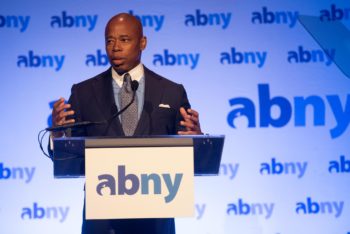
Mayor Adams announces the new proposed zoning text amendments. Image Credit: Michael Appleton/Mayoral Photography Office
The zoning text amendments are in development and will be drafted with input from stakeholders before undergoing public review later this year. On June 1, 2022, Mayor Eric Adams announced a plan for a series of new zoning text amendments and programs aimed at removing obstacles for the recovery of small businesses, increased affordable housing, and the expansion of green technology to promote sustainability. The three zoning text amendments – the Zoning for Economic Opportunity, Zoning for Housing Opportunity, and Zoning for Zero Carbon aim to reduce bureaucracy within the City’s zoning text to make room for the City’s continued growth and recovery from the COVID-19 pandemic.
The Zoning for Economic Opportunity text amendment will provide local businesses with more flexibility to expand and repurpose their spaces. The amendment will also remove geographic limitations on certain types of businesses including life sciences, maker-retail, custom manufacturing, and nightlife. The change to nightlife includes the removal of remaining restrictions following the repeal of the Cabaret law in 2017.
The Zoning for Housing Opportunity will create more affordable housing by increasing the floor area ratio for new developments that have affordable housing components to make it similar to the allowance for affordable housing for seniors. The amendment also removes obstacles for conversions of underutilized commercial buildings to residential spaces and expands the acceptable variety of housing sizes and types.
Both amendments will also reduce certain parking requirements.
The Zoning for Zero Carbon text amendment will assist the City in achieving its goals for carbon reduction. The amendment will help improve clean energy storage, including electric vehicle charging. The amendment also helps buildings retrofit for sustainability features such as solar panels and removes obstacles to the electrification of building systems like efficient HVAC systems.
CityLand reached out to the Department of City Planning to learn more about the specifics of the text amendments. According to a DCP spokesperson, the contents of the proposed zoning text amendments are still in development. The agency will continue to work with stakeholders and community members to develop the text amendments before they enter a public review process later this year.
Mayor Adams stated, “We are going to turn New York into a ‘City of Yes’ — yes in my backyard, yes on my block, yes in my neighborhood. These proposals focused on economic recovery, affordable housing, and sustainability will remove red tape for small businesses, expand housing opportunities in every neighborhood, and accelerate the transition to our energy future. New Yorkers are not going to wait around while other cities and other countries sprint towards a post-pandemic world, and now we won’t have to.”
Department of City Planning Director and City Planning Commission Chair Dan Garodnick stated, “These citywide initiatives will help us significantly to create jobs, to promote a more sustainable city, and to deliver housing everywhere. And what’s more, we are committed to making our land use process work faster and better as we deliver results. With these changes, we’re setting the stage for a more adaptable New York City that moves with the times.”
Industry stakeholders and advocates shared their enthusiasm for the proposed text amendments.
Julie Tighe, president of the New York League of Conservation Voters stated, “Zoning for Zero Carbon is a forward-looking plan to ensure the city continues to innovate and build with a focus on eliminating greenhouse gas emissions and fossil fuels. By removing obstacles to deploy new clean energy storage and electric vehicle charging infrastructure, and making it easier to retrofit buildings for sustainability, the city is removing barriers to clean, green progress.”
Carlo A. Scussura, president and CEO of the New York Building Congress stated, “The Building Congress’ number-one priorities for construction growth, as announced in our ‘100 Years: Policy’ report last month, call for streamlined approvals, more flexible zoning rules, and elimination of obsolete zoning distinctions. Mayor Adams is hitting it out of the park with today’s announcements. We applaud his moving to eliminate burdensome red tape and look forward to working hand-in-hand with his administration to ensure smooth, safe transitions with the changed rules and regulations.”
Sarah Watson, interim executive director, Citizens Housing and Planning Council stated, “We are so excited that the Adams administration is being bold about increasing housing opportunities all across the city. As we face concurrent crises of housing affordability and homelessness, racial and economic inequality and climate change, we are desperate for new safe and legal housing options for New Yorkers, especially in neighborhoods where new housing opportunities have been limited and our housing supply cannot keep up with our demand pressures. Zoning changes are a powerful tool to create a clear pathway to a more equitable and inclusive city, and we laud the administration for putting forward a strategy for citywide zoning reform that will allow us to move onward and upward.”
Council Member Keith Powers stated, ““Mayor Adams’ announcement today to modernize the city’s zoning code is long overdue. I’m happy to join Mayor Adams in calling for an end to zoning that ends the harmful remnants of the Cabaret Law. After such difficult times, New Yorkers deserve the right to dance freely and celebrate our great city. This is a great dance, dance, resolution.”
CityLand will continue to follow the development of these text amendments. For our further coverage of this topic, click here.
By: Veronica Rose (Veronica is the CityLaw fellow and a New York Law School graduate, Class of 2018.)


These rezoning proposals will go nowhere in the City Council. Most residential neighborhoods in the city prefer downzonings to upzonings.